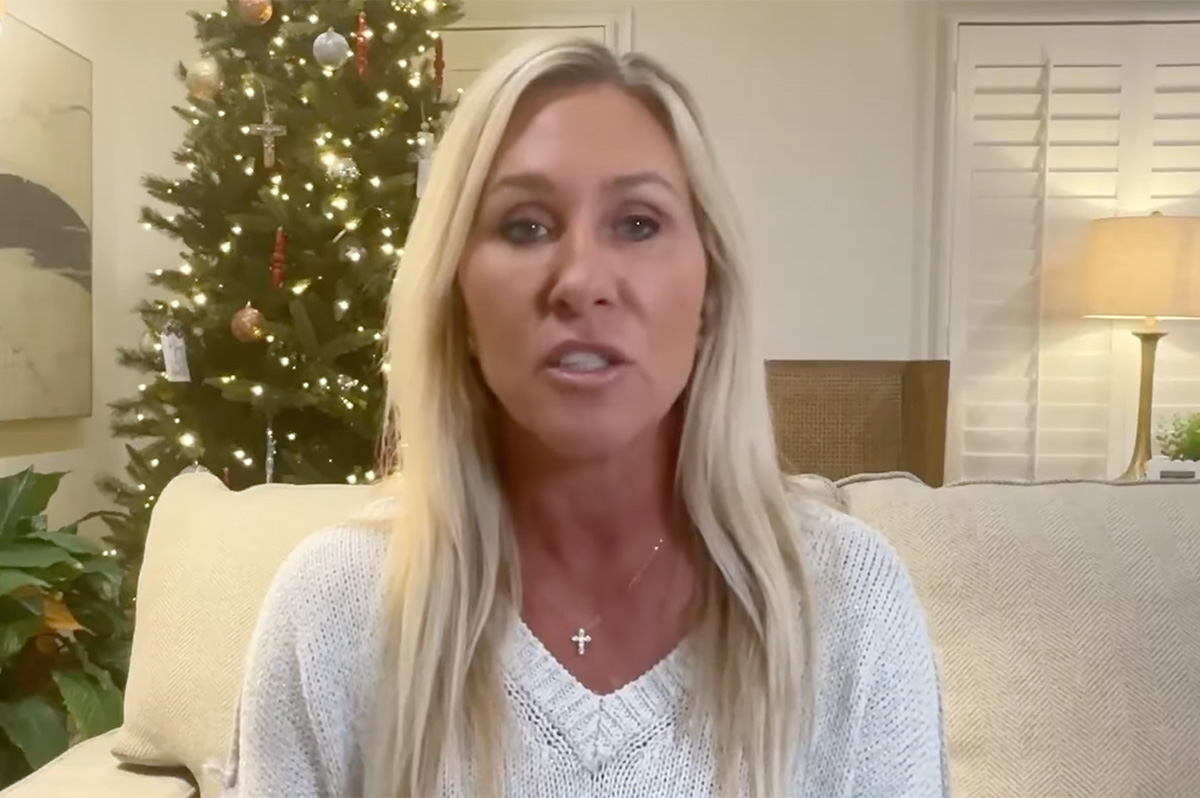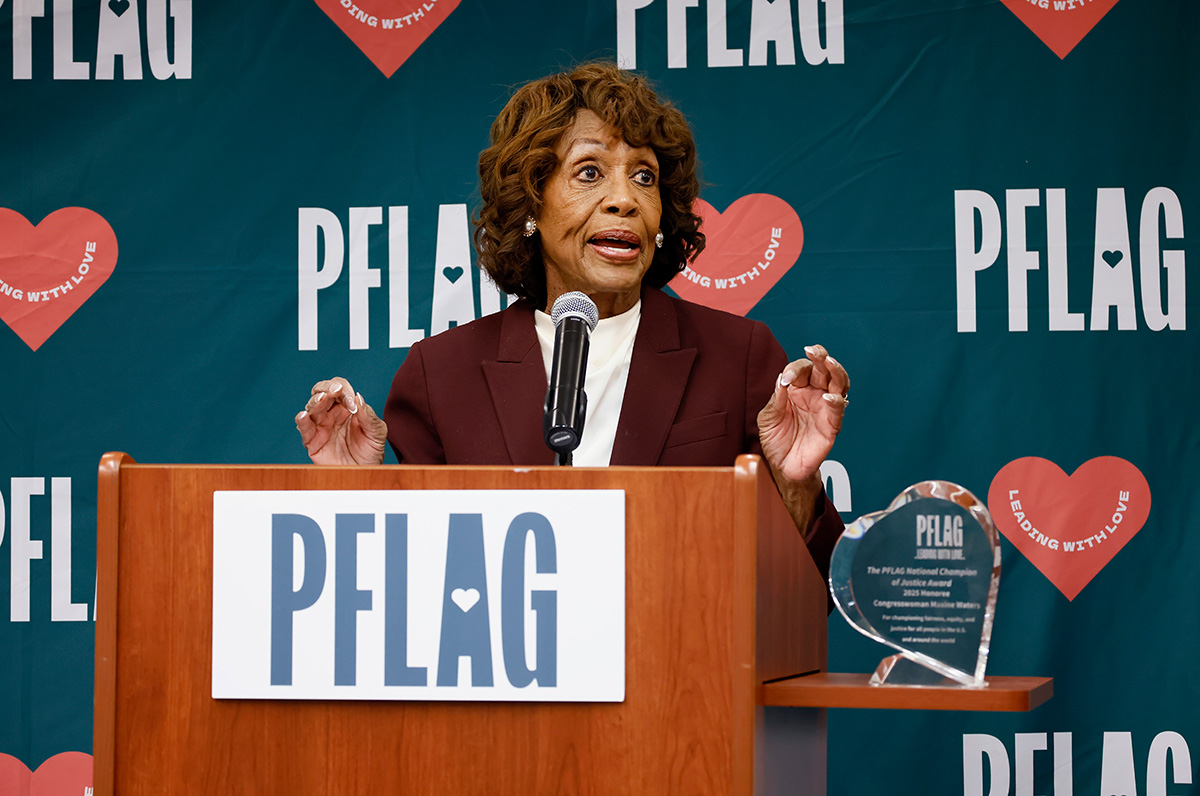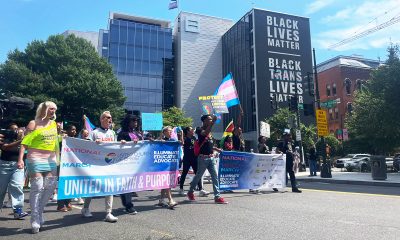Politics
Rubio continues hold on gay black judicial nominee
Florida Republican only obstacle to advancing nomination


Sen. Marco Rubio is holding up the nomination of a gay black judicial nominee who’d be the first openly gay black male to serve on the federal bench. (Blade file photo by Michael Key).
LGBT groups are pressuring the Senate to push forward with the confirmation of the first openly gay black male to the federal bench now that a hold from Sen. Marco Rubio (R-Fla.) is the only hold up in the process.
The confirmation of William Thomas, whom President Obama first named in November for a seat on the U.S. District Court for the Southern District of Florida, was as of last week held up by both U.S. senators in Florida — Bill Nelson and Rubio — who had yet to return the “blue slips” for the nomination even though it had been pending for more than eight months.
But on Wednesday, following the publication of several media reports on the issue — including one from the Washington Blade — Nelson submitted the blue slips for the nomination, according to Senate sources familiar with the process. Dan McLaughlin, a Nelson spokesperson, confirmed the Florida Democrat had returned the blue slips for the nomination.
Nelson’s office had previously said the senator hadn’t submitted the blue slips because the Senate Judiciary Committee hadn’t yet completed the background investigation on the nomination.
Nelson’s lifting of his hold on the nominee means Rubio is now the only senator obstructing Thomas from proceeding through the confirmation process. Other judicial nominees renominated at the start of the 113th Congress have received confirmation, but no action has been taken on Thomas.
Rubio’s office didn’t respond to repeated requests from the Blade over the past two weeks to comment on why he continues to hold up the Thomas nomination. According to a report last week in the Tampa Bay Times, Rubio has concerns about Thomas’s involvement in a controversial case in which a man was given a sentence of just 364 days in jail for the hit-and-run death of a cyclist.
A judge is seeking to allay these concerns about Thomas in a letter to Rubio that was obtained by the Blade.
In the July 19 missive, Nushin Sayfie, administrative judge for the criminal division of the Eleventh Judicial Circuit in Florida, says the sentence Thomas gave in the case was within his guideline range. The name of the case, the victim and the defendant aren’t found in the letter.
Sayfie maintains that unlike what the media reported, the defendant wasn’t charged in the death of the victim, but “charged with leaving the scene of an accident (involving death).” Further, Sayfie said the defendant filed a motion for downward departure on the grounds that he suffered from a rare blood disease that placed him at risk of death during a prison sentence, but Thomas denied this motion.
According to Sayfie, Thomas sentenced the defendant to 23 months in state prison followed by two years of community control, but allowed him to finish the sentence locally to accommodate his medical condition.
“I hope this communication helps to answer some of the concerns you might have,” Sayfie concludes. “I have known Judge William Thomas as a colleague and friend for approximately nineteen (19) years. It was my pleasure to serve as a reference for him for the federal bench (and be interviewed at length by the ABA, the FBI and the White House Counsel’s Office!) He is a dedicated, intelligent and hard-working public servant.”
Thomas has experience both as a defense attorney and as a judge. He’s been a circuit judge in Florida’s 11th Judicial Circuit since 2005, where he has presided over both civil and criminal matters. Before that, he was an assistant federal public defender in the Southern District of Florida and represented indigent clients in federal criminal cases.
Rubio faced criticism last week from members of the Congressional Black Caucus for holding up both the Thomas confirmation and that of Brian Davis, another black judicial nominee who was nominated for a seat on the U.S. District Court for Middle District of Florida. The Gay & Lesbian Victory Fund also called for the Thomas nomination to move forward.
Rubio continues to hold up the Thomas nomination even though he and Nelson recommended Thomas for the seat following approval from Florida’s Federal Judicial Nominating Commission, which makes recommendations to the state’s senators.
But in the aftermath of Nelson lifting his hold, other LGBT groups stepped up the pressure for movement on the nomination when asked for comment by the Washington Blade.
Fred Sainz, vice president of communications for the Human Rights Campaign, is among those calling for Rubio to take action.
“He should return the blue slip and allow this well-qualified jurist to get confirmed by the U.S. Senate,” Sainz said. “The federal district court system is already backlogged. There’s no good reason why justice should be further delayed when Judge Thomas is ready, willing and able to serve.”
Sharon Lettman-Hicks, CEO of the National Black Justice Coalition, said as a Floridian for more than 25 years, she’s “disgusted” by Rubio’s lack of action on the Thomas nomination.
“By the accounts of Florida’s Federal Judicial Nominating Commission and even Senator Rubio, himself, Judge Thomas has been a principled jurist who would serve our nation with distinction on the federal bench,” Lettman-Hicks said. “Judge Thomas deserves a nomination process unobstructed by the malevolent politics of the right-wing agenda, and it is inexcusable that Senator Rubio would block the nomination of such a highly qualified and exemplary candidate, particularly at a time when our judicial system is hemorrhaging with a bevy of judicial vacancies in critical seats.”
No one has alleged discrimination based on sexual orientation as a reason for the holdup on the Thomas nomination, although the Congressional Black Caucus last week drew attention to the fact that Rubio was holding up two black judicial nominees.
Shin Inouye, a White House spokesperson, joined in the calls for movement on the Thomas nomination after being silent last week when both Florida senators were holding it up.
“The president nominated Judge William Thomas more than eight months ago,” Inouye said. “This judicial vacancy has been declared a ‘judicial emergency,’ and the non-partisan American Bar Association has rated Judge Thomas ‘well-qualified.’ Unfortunately, his nomination continues to be stalled, and the Senate should promptly consider it without further delay.”
Thomas would be the first openly gay black male to serve on the federal judiciary; U.S. District Judge Deborah Batts — who was appointed by President Clinton in 1994 — is black and a lesbian.
Congress
MTG resigns after years of anti-LGBTQ attacks amid Trump feud
Greene’s abrupt departure adds fresh uncertainty to an already fractured Republican Party.

Rep. Marjorie Taylor Greene announced on Friday that she is resigning from Congress.
In a post on X (formerly Twitter), the Georgia 14th Congressional District representative announced her sudden decision to resign from office.
The nearly 11-minute-long video shows Rep. Greene stating she will step down from her role representing one of Georgia’s most Republican districts on Jan. 5, 2026. She cited multiple reasons for this decision, most notably her very public separation from Trump.
In recent weeks, Greene — long one of the loudest and most supportive MAGA members of Congress — has butted heads with the president on a slew of topics. Most recently, she supported pushing the DOJ to release the Epstein Files, becoming one of only four Republicans to sign a discharge petition, against Trump’s wishes.
She also publicly criticized her own party during the government shutdown. Rep. Greene had oddly been supportive of Democratic initiatives to protect healthcare tax credits and subsidies that were largely cut out of national healthcare policy as a result of Trump’s “Big Beautiful Bill,” passed in July.
“What I am upset over is my party has no solution,” Greene said in October.
Trump recently said he would endorse a challenger against the congresswoman if she ran for reelection next year, and last week went as far as to declare, “Marjorie ‘Traitor’ Green is a disgrace to our GREAT REPUBLICAN PARTY!” on his Truth Social platform.
Trump told ABC News on Friday night that Greene’s resignation is “great news for the country,” and added that he has no plans to speak with Greene but wishes her well.
Despite her recent split with the head of the Republican Party, Rep. Greene has consistently taken a staunch stance against legislation supporting the LGBTQ community — notably a hardline “no” on any issue involving transgender people or their right to gender-affirming care.
Rep. Greene has long been at odds with the LGBTQ community. Within her first month in office, she criticized Democrats’ attempts to pass the Equality Act, legislation that would bar anti-LGBTQ employment discrimination. She went as far as to suggest an apocalypse-like scenario if Congress passed such a measure.
“God created us male and female,” she said on the House floor. “In his image, he created us. The Equality Act that we are to vote on this week destroys God’s creation. It also completely annihilates women’s rights and religious freedoms. It can be handled completely differently to stop discrimination without destroying women’s rights, little girls’ rights in sports, and religious freedom, violating everything we hold dear in God’s creation.”
Greene, who serves one of the nation’s most deeply red districts in northwest Georgia, attempted to pass legislation dubbed the “Protect Children’s Innocence Act,” which would have criminalized gender-affirming care for minors and restricted federal funding and education related to gender-affirming care in 2023. The bill was considered dead in January 2025 after being referred to the House Committee on the Judiciary.
Her push came despite multiple professional medical organizations, including the nation’s largest and most influential — the American Medical Association — stating that withholding gender-affirming care would do more harm than any such care would.
She has called drag performers “child predators” and described the Democratic Party as “the party of killing babies, grooming and transitioning children, and pro-pedophile politics.”
Greene has also publicly attacked Delaware Rep. Sarah McBride, the nation’s first and only transgender member of Congress. She has repeatedly misgendered and attacked McBride, saying, “He’s a man. He’s a biological male,” adding, “he’s got plenty of places he can go” when asked about bathrooms and locker rooms McBride should use. Greene has also been vocal about her support for a bathroom-usage bill targeting McBride and transgender Americans as a whole.
She has repeatedly cited false claims that transgender people are more violent than their cisgender counterparts, including falsely stating that the 2022 Robb Elementary School shooter in Texas was transgender.
The former MAGA first lady also called for an end to Pride month celebrations. She criticized the fact that the LGBTQ community gets “an entire” month while veterans get “only one day each year” in an X post, despite November being designated as National Veterans and Military Families Month.
Under Georgia law, Gov. Brian Kemp (R) must hold a special election within 40 days of the seat becoming vacant.
The Washington Blade reached out to both the White House and Greene’s office for comment, but has not heard back.

PFLAG honored U.S. Rep. Maxine Waters (D-Calif.) with the “2025 PFLAG National Champion of Justice” award during their annual “Love Takes Justice” event in Washington.
Waters has represented California’s 43rd Congressional District — including much of Los Angeles — since 1991 and has been a vocal advocate for LGBTQ rights since her swearing-in.
Her track record includes opposing the Defense of Marriage Act, which would have made marriage only between a man and a woman; co-sponsoring the Respect for Marriage Act, ultimately requiring all U.S. states to recognize same-sex marriages performed by other states; and is a long time supporter of the Equality Act, which would codify comprehensive protections for LGBTQ Americans.
In addition to her work on marriage equality, she also created the Minority AIDS Initiative to help address the devastating impact of HIV/AIDS on minority communities, particularly communities of color.
The award reception took place Tuesday at the headquarters of the American Federation of Teachers, where Waters was presented with the award by former U.S. Rep. Barney Frank (D-Mass.), the openly gay member of Congress. Frank praised Waters for her unwavering support for the LGBTQ community and her lifelong commitment to advancing equality for all.
“One of the most encouraging developments in the fight for human rights is the failure of those who traffic in any form of bigotry, including bigotry to divide the Black and LGBTQ+ communities,” said Frank, who came out in 1987 while in office. “No one deserves more recognition for strengthening our unity than Maxine Waters.”
During the reception, Waters spoke about her extensive history of LGBTQ advocacy within the halls of Congress, emphasizing that her idea of government centers around uplifting its most vulnerable and threatened communities.
“From the very beginning of my public life I’ve believed that the government must protect those that are vulnerable, including LGBTQ+ people, who have been pushed to the margins, criminalized and told that their lives and their love do not matter,” Waters said. “Discrimination has no place in our laws.”
She continued, adding that the discrimination LGBTQ people have dealt with — and continue to deal with — is unconstitutional and wrong.
“I am proud to stand with LGBTQ+ families against efforts to write discrimination into our constitution, against attempts to deny people jobs, housing, healthcare and basic dignity because of who they are or who they love,” she said.
Waters joins a slew of other LGBTQ advocates who have received this award, beginning with the late-Georgia Congressman John Lewis in 2018. Past honorees include Oakland (Calif.) Mayor Barbara Lee, who was then a member of Congress, U.S. Sen. Tammy Baldwin (D-Wis.), Frank, Colorado Gov. Jared Polis, who was then a member of Congress, and Speaker Emerita Nancy Pelosi (D-Calif.).
PFLAG CEO Brian Bond commented on the continued fight for LGBTQ rights in the U.S. as anti-transgender rhetoric and policies coming from the Trump-Vance White House grow each week.
“LGBTQ+ people and their families — and all of you here — know too well the reality of the political climate, the attitudes of the public, and the sheer lack of respect that LGBTQ+ people are experiencing in the world today. There’s no end to the hostile barrage of harmful laws, city ordinances, and regulations, especially against our trans loved ones,” Bond said. “This particular moment in history calls us to increase and fortify our work, advocating at every level of government.”
He ended with some hope — reminding the LGBTQ community they have been on the receiving end of discrimination and unjust treatment before, but have risen above and changed the laws — saying we can do it again.
“PFLAG members and supporters are uniquely suited for this moment, because we are fighting for and alongside our LGBTQ+ loved ones, we know that our love is louder … and love and liberty are inseparable,” said Bond.
Congress
Global Respect Act reintroduced in US House
Measure would sanction foreign officials responsible for anti-LGBTQ human rights abuses

U.S. Reps. Sarah McBride (D-Del.) and Brian Fitzpatrick (R-Pa.) on Thursday reintroduced a bill that would sanction foreign officials who carry out anti-LGBTQ human rights abuses.
A press release notes the Global Respect Act would direct “the U.S. government to identify and sanction foreign persons who are responsible for torture, arbitrary detention, physical attacks, murder, and other flagrant abuses against LGBTQI+ individuals.” The measure would also require “annual human rights reporting from the State Department and strengthens coordination with foreign governments, civil society, and the private sector to prevent anti-LGBTQI+ persecution.”
“Freedom and dignity should never depend on your zip code or who holds power in your country,” said McBride.
The Delaware Democrat who is the first openly transgender person elected to Congress notes consensual same-sex sexual relations remain criminalized in more than 60 countries, while “far too many (countries) look away from the violence that follows.”
“The Global Respect Act reaffirms a simple truth: no one should be targeted for who they are or whom they love,” said McBride. “This bill strengthens America’s voice on human rights.”
“No person should ever face imprisonment, violence, or discrimination on the basis of who they are,” added Fitzpatrick. “The Global Respect Act imposes real and necessary sanctions on those who carry out these abuses and strengthens America’s resolve to uphold basic human rights worldwide.”
The Global Respect Act has 119 co-sponsors. McBride and Fitzpatrick reintroduced it in the U.S. House of Representatives on the annual Transgender Day of Remembrance.
“As we mark Transgender Day of Remembrance, we reaffirm that no one, no matter where they live in the world, should be persecuted or subjected to violence simply because of who they are or whom they love,” said Mark Bromley, co-chair of the Council for Global Equality. “The Global Respect Act seeks to hold the world’s worst perpetrators of violence against LGBTQI+ people accountable by leveraging our sanctions regimes to uphold the human rights of all people.”
Outright International, Amnesty International USA, Robert F. Kennedy Human Rights, ORAM (Organization for Refuge, Asylum and Migration), and the Human Rights Campaign are among the other groups that have endorsed the bill.
U.S. Sens. Jeanne Shaheen (D-N.H.) and Lisa Murkowski (R-Alaska) in June introduced the Global Equality Act in the U.S. Senate. Gay California Congressman Robert Garcia and U.S. Sen. Edward Markey (D-Mass.) on Monday introduced the International Human Defense Act that would require the State Department to promote LGBTQ and intersex rights abroad.
The promotion of LGBTQ and intersex rights was a cornerstone of the Biden-Harris administration’s overall foreign policy.
The global LGBTQ and intersex rights movement since the Trump-Vance administration froze nearly all U.S. foreign aid has lost more than an estimated $50 million in funding.
The U.S. Agency for International Development, which funded dozens of advocacy groups around the world, officially shut down on July 1. Secretary of State Marco Rubio earlier this year said the State Department would administer the remaining 17 percent of USAID contracts that had not been cancelled.
-

 Opinions5 days ago
Opinions5 days agoVictory Fund continues to shun me and my place in LGBTQ history
-

 LGBTQ Non-Profit Organizations4 days ago
LGBTQ Non-Profit Organizations4 days agoVictory Institute honors President Biden
-

 Opinions4 days ago
Opinions4 days agoTammy Bruce, Trump’s lesbian nominee for deputy UN ambassador. Just say no!
-

 Maryland4 days ago
Maryland4 days agoFreeState Justice launches 501(c)(4) group
















